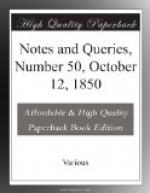4. Does the Cambridge University Library contain a copy of the first edition of Daniel’s translation?
Ale Draper—Eugene Aram.—In Hargrove’s well-known history of Eugene Aram, the hero of Bulwer’s still better known novel, one of the guilty associates of the Knaresborough murderer is designated as an “Ale Draper.” As this epithet never presented itself in my reading, and as I am not aware that draper properly admits of any other definition than that given by Johnson, “one who deals in cloth,” may I ask whether the word was ever in “good use” in the above sense?
My main purpose in writing, is to propound the foregoing Query; but while I have the pen in hand permit me to ask,—
1. Whether it be possible to read the celebrated “defence,” so called, which was delivered by Aram on his trial at York, without concurring with the jury in their verdict, and with the judge in his sentence? In short, without a strong feeling that the prisoner would not have been hanged, but for that over-ingenious, and obviously evasive, address, in which the plain averment of “not guilty” does not occur.
2. Has not the literary character, especially the philological attainments, of this noted malefactor been vastly over-rated? And
3. Ought not the “memoirs” of “this great man” by Mr. Scatcherd to be ranked among the most remarkable attempts ever made, and surely made
“—in vain,
To wash the murderer from blood-guilty
stain?”
D.
Rotherfield
Latin Epigram.—Can any of your correspondents inform me who was the author of the following epigram:—
IN MEMORIAM G.B.M.D.
“Te tandem tuus Oreus habet, quo
civibus Orei
Gratius haud unquam misit Apollo caput;
Quippe tuo jussu terras liquere, putantque
Tartara se jussu linquere posse tuo.”
The person alluded to was Sir W. Browne, M.D., the founder of the Browne medals in the University of Cambridge. Some old fellow of King’s College may be able to inform me.
The medals were first given about the year 1780, and in the first year, I presume, out of respect to the memory of the donor, no subject was given for Epigrams. It has occurred to me, that perhaps some wag on that occasion sent the lines as a quiz.
W.S.
Richmond, Surrey
Couplet in De Foe—
“Restraint from ill is freedom to
the wise,
And good men wicked liberties despise.”
This couplet is at the end of the second letter in De Foe’s Great Law of Subordination, p. 42. Is it his own? If not, where did he get it?
N.B.
Books wanted to refer to.—
“Hollard’s Travels
(1715), by a French Protestant Minister,
afterwards suppressed by the
author.”
“Thomas Bonnell, Mayor of Norwich, Life of.”
“Canterbury, Letters
and Memoirs on the Excommunication of two
Heretics, 1698.”




